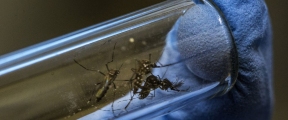
The Chicago Department of Public Health (CDPH) is continuing its efforts against West Nile virus. Based on results from its citywide mosquito surveillance program, CDPH has determined the need to spray to kill adult mosquitoes this week. “When our mosquito traps indicate that the West Nile virus may pose health risks in a community, we take action quickly,” said CDPH Commissioner Julie Morita, M.D. “But spraying is just one step to protect our city, residents must also take appropriate steps to protect themselves.” CDPH reminds residents to take precautions against mosquitoes that may carry the virus, including:
- Use insect repellent that contains DEET, Picaridin or Oil of Lemon Eucalyptus.
- Eliminate standing water. This includes emptying water from flowerpots, gutters, pool covers, pet water dishes and birdbaths regularly.
- Keep grass and weeds short to eliminate hiding places for adult mosquitoes.
- When outside between dusk and dawn, wear loose-fitting, light colored clothing including long pants, long sleeve shirts, socks and shoes.
- Check that all screens, windows and doors are tight-fitting and free of holes and tears.
- Check on neighbors regularly who may need additional assistance, including the elderly.
Each year, CDPH conducts a comprehensive mosquito surveillance, prevention and control program to protect residents from West Nile virus and other diseases spread by mosquitoes. In 2016, CDPH previously sprayed in the following neighborhoods:
Albany Park (8/9)
Ashburn (8/10)
Auburn Gresham (8/2)
Chatham (8/2)
Chicago Lawn (8/10 and 8/17)
Dunning (8/16)
East Garfield Park (8/17)
Jefferson Park (8/16)
Forest Glen (8/9)
Gage Park (8/10)
Humboldt Park (8/17)
New City (8/10)
North Park (8/9)
Norwood Park (8/9 and 8/16)
Portage Park (8/16)
Washington Heights (8/2)
West Englewood (8/10)
West Garfield Park (8/17)
West Lawn (8/10 and 8/17)
West Ridge (8/24)
Though mosquitoes found to carry the Zika virus are not native to Chicago, CDPH has launched a recent campaign, #StopZika, to educate residents traveling to Zika-infested regions how to protect themselves. The campaign also reminds residents how the department is working to prevent mosquito-borne viruses that are endemic to Chicago, including West Nile virus.










